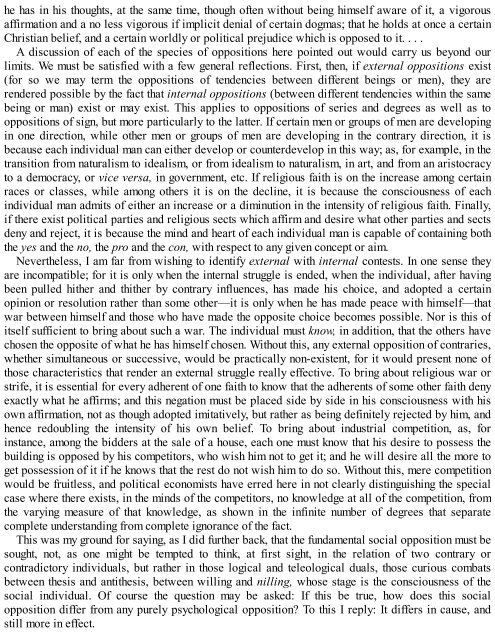3658925934
Create successful ePaper yourself
Turn your PDF publications into a flip-book with our unique Google optimized e-Paper software.
he has in his thoughts, at the same time, though often without being himself aware of it, a vigorous<br />
affirmation and a no less vigorous if implicit denial of certain dogmas; that he holds at once a certain<br />
Christian belief, and a certain worldly or political prejudice which is opposed to it. . . .<br />
A discussion of each of the species of oppositions here pointed out would carry us beyond our<br />
limits. We must be satisfied with a few general reflections. First, then, if external oppositions exist<br />
(for so we may term the oppositions of tendencies between different beings or men), they are<br />
rendered possible by the fact that internal oppositions (between different tendencies within the same<br />
being or man) exist or may exist. This applies to oppositions of series and degrees as well as to<br />
oppositions of sign, but more particularly to the latter. If certain men or groups of men are developing<br />
in one direction, while other men or groups of men are developing in the contrary direction, it is<br />
because each individual man can either develop or counterdevelop in this way; as, for example, in the<br />
transition from naturalism to idealism, or from idealism to naturalism, in art, and from an aristocracy<br />
to a democracy, or vice versa, in government, etc. If religious faith is on the increase among certain<br />
races or classes, while among others it is on the decline, it is because the consciousness of each<br />
individual man admits of either an increase or a diminution in the intensity of religious faith. Finally,<br />
if there exist political parties and religious sects which affirm and desire what other parties and sects<br />
deny and reject, it is because the mind and heart of each individual man is capable of containing both<br />
the yes and the no, the pro and the con, with respect to any given concept or aim.<br />
Nevertheless, I am far from wishing to identify external with internal contests. In one sense they<br />
are incompatible; for it is only when the internal struggle is ended, when the individual, after having<br />
been pulled hither and thither by contrary influences, has made his choice, and adopted a certain<br />
opinion or resolution rather than some other—it is only when he has made peace with himself—that<br />
war between himself and those who have made the opposite choice becomes possible. Nor is this of<br />
itself sufficient to bring about such a war. The individual must know, in addition, that the others have<br />
chosen the opposite of what he has himself chosen. Without this, any external opposition of contraries,<br />
whether simultaneous or successive, would be practically non-existent, for it would present none of<br />
those characteristics that render an external struggle really effective. To bring about religious war or<br />
strife, it is essential for every adherent of one faith to know that the adherents of some other faith deny<br />
exactly what he affirms; and this negation must be placed side by side in his consciousness with his<br />
own affirmation, not as though adopted imitatively, but rather as being definitely rejected by him, and<br />
hence redoubling the intensity of his own belief. To bring about industrial competition, as, for<br />
instance, among the bidders at the sale of a house, each one must know that his desire to possess the<br />
building is opposed by his competitors, who wish him not to get it; and he will desire all the more to<br />
get possession of it if he knows that the rest do not wish him to do so. Without this, mere competition<br />
would be fruitless, and political economists have erred here in not clearly distinguishing the special<br />
case where there exists, in the minds of the competitors, no knowledge at all of the competition, from<br />
the varying measure of that knowledge, as shown in the infinite number of degrees that separate<br />
complete understanding from complete ignorance of the fact.<br />
This was my ground for saying, as I did further back, that the fundamental social opposition must be<br />
sought, not, as one might be tempted to think, at first sight, in the relation of two contrary or<br />
contradictory individuals, but rather in those logical and teleological duals, those curious combats<br />
between thesis and antithesis, between willing and nilling, whose stage is the consciousness of the<br />
social individual. Of course the question may be asked: If this be true, how does this social<br />
opposition differ from any purely psychological opposition? To this I reply: It differs in cause, and<br />
still more in effect.









![Genki - An Integrated Course in Elementary Japanese II [Second Edition] (2011), WITH PDF BOOKMARKS!](https://img.yumpu.com/58322134/1/180x260/genki-an-integrated-course-in-elementary-japanese-ii-second-edition-2011-with-pdf-bookmarks.jpg?quality=85)
![Genki - An Integrated Course in Elementary Japanese I [Second Edition] (2011), WITH PDF BOOKMARKS!](https://img.yumpu.com/58322120/1/182x260/genki-an-integrated-course-in-elementary-japanese-i-second-edition-2011-with-pdf-bookmarks.jpg?quality=85)





